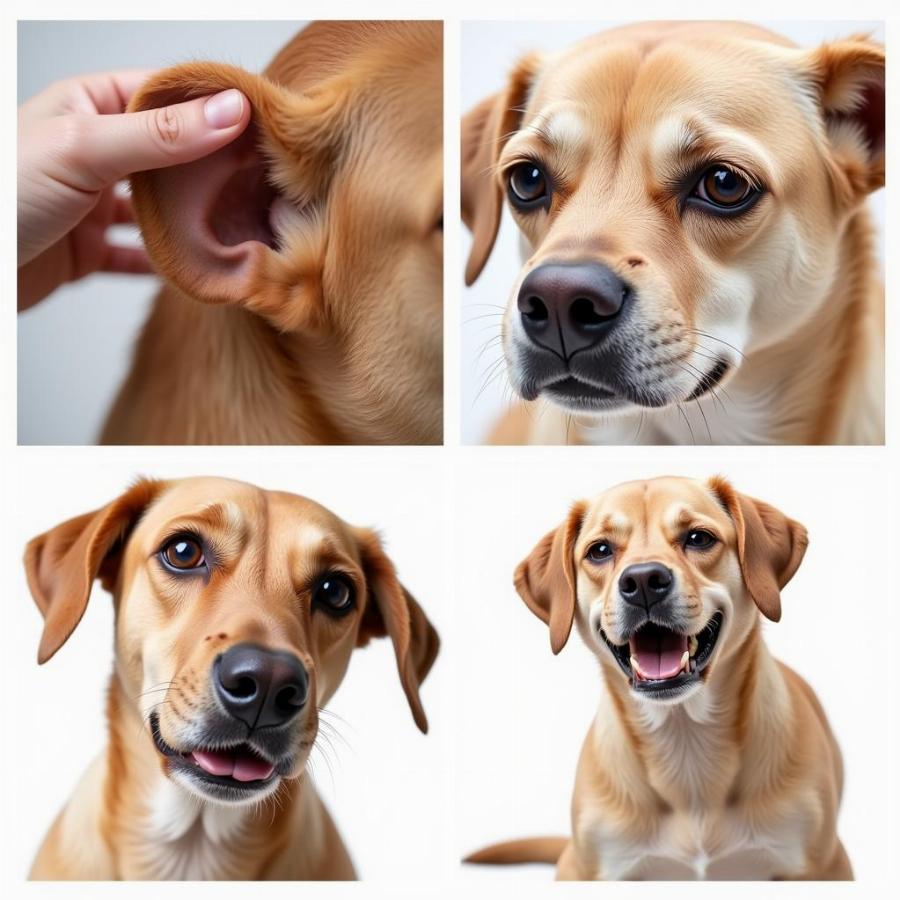Do dogs cough from allergies? Absolutely. Just like humans, our canine companions can suffer from allergies that trigger a persistent cough. Understanding the link between allergies and coughing in dogs is crucial for providing them with the appropriate care and relief. This article will delve into the various types of allergies that can cause coughing in dogs, common symptoms, diagnosis, and treatment options. We’ll also explore preventative measures to help minimize your dog’s exposure to allergens and keep them healthy and happy.
Understanding Canine Allergies and Coughing
Allergies in dogs occur when their immune system overreacts to substances that are typically harmless, known as allergens. These allergens can range from pollen and dust mites to certain foods and even insect bites. When a dog is exposed to an allergen, their body releases histamine, which triggers a cascade of inflammatory responses. This inflammation can affect the respiratory system, leading to coughing, as well as other symptoms. The type and severity of the cough can vary depending on the specific allergen and the individual dog’s sensitivity.
One of the most common types of canine allergies is environmental allergies, often referred to as atopy. These allergies are typically seasonal, triggered by pollen from trees, grasses, and weeds. Inhaled allergens can directly irritate the airways, causing inflammation and coughing. If your dog’s coughing seems to worsen during specific times of the year, such as spring or fall, environmental allergies might be the culprit.
Identifying Allergy-Related Coughing in Dogs
How can you tell if your dog’s cough is due to allergies? While coughing is a common symptom of many canine ailments, several clues can point to allergies as the underlying cause. Allergy-related coughs are often dry and hacking, and may be accompanied by other symptoms such as sneezing, watery eyes, itching, and skin irritation. dog snoring loud is not usually related to allergies. If your dog exhibits any of these symptoms in conjunction with a cough, it’s essential to consult a veterinarian for a proper diagnosis.
 Các triệu chứng dị ứng ở chó
Các triệu chứng dị ứng ở chó
Another tell-tale sign of allergy-related coughing is its persistence. Unlike coughs associated with infections, which typically resolve within a few weeks, allergy-induced coughs can linger for extended periods, especially if the dog remains exposed to the allergen. Pay attention to the duration and frequency of your dog’s cough to help your veterinarian determine the underlying cause.
Diagnosing and Treating Canine Allergies
Diagnosing canine allergies can be a multi-step process. Your veterinarian will likely begin by performing a thorough physical examination and reviewing your dog’s medical history. They may also recommend allergy testing, which can involve skin or blood tests, to identify specific allergens. Once the allergens are identified, your veterinarian can develop a tailored treatment plan to manage your dog’s allergies and alleviate their coughing.
Treatment options for allergy-related coughing can include antihistamines, corticosteroids, and immunomodulatory drugs. In some cases, your veterinarian may recommend allergen-specific immunotherapy, also known as allergy shots, to desensitize your dog to the offending allergens. dog hoarse from barking can have different causes and treatments than allergy coughs. It’s crucial to follow your veterinarian’s instructions carefully and administer medications as prescribed.
Preventing Allergy-Related Coughing in Dogs
While not all allergies are preventable, there are several steps you can take to minimize your dog’s exposure to allergens and reduce the likelihood of coughing. Regularly cleaning your home, including vacuuming carpets and washing bedding, can help remove dust mites and other allergens. Using air purifiers with HEPA filters can also help improve indoor air quality.
If your dog suffers from environmental allergies, limiting their outdoor exposure during peak pollen seasons can help reduce their symptoms. antifungal medication for dogs might be prescribed if fungal allergies are suspected. Regular bathing with a hypoallergenic shampoo can help remove allergens from their coat and skin. my dog is coughing and wheezing requires immediate veterinary attention. Remember, providing a clean and allergen-free environment is crucial for managing your dog’s allergies and preventing coughing. dog cough tablets can be a part of the treatment plan prescribed by a vet.
Conclusion
Allergies can indeed cause coughing in dogs, impacting their comfort and overall well-being. By understanding the causes, symptoms, and treatment options for allergy-related coughing, you can help your furry friend breathe easier and live a happier, healthier life. Don’t hesitate to seek professional veterinary care if you suspect your dog is suffering from allergies. Early diagnosis and appropriate treatment are key to managing allergies and preventing long-term complications.
FAQ
- What are the most common allergens that cause coughing in dogs? Pollen, dust mites, mold spores, and certain foods are common culprits.
- How can I tell if my dog’s cough is due to allergies? Look for accompanying symptoms like sneezing, itching, and watery eyes, and consider if the cough is seasonal.
- What are the treatment options for allergy-related coughing in dogs? Antihistamines, corticosteroids, immunotherapy, and environmental management can help.
- Can I prevent my dog from developing allergies? While not entirely preventable, minimizing allergen exposure can significantly reduce the risk and severity of allergies.
- How often should I bathe my allergic dog? Consult your veterinarian, but generally, bathing every 1-2 weeks with a hypoallergenic shampoo can be beneficial.
- Are there any home remedies for dog allergies? While some home remedies may provide temporary relief, it’s crucial to consult your vet for a proper diagnosis and treatment plan.
- Can allergies cause other respiratory problems in dogs besides coughing? Yes, allergies can also lead to wheezing, sneezing, and difficulty breathing.